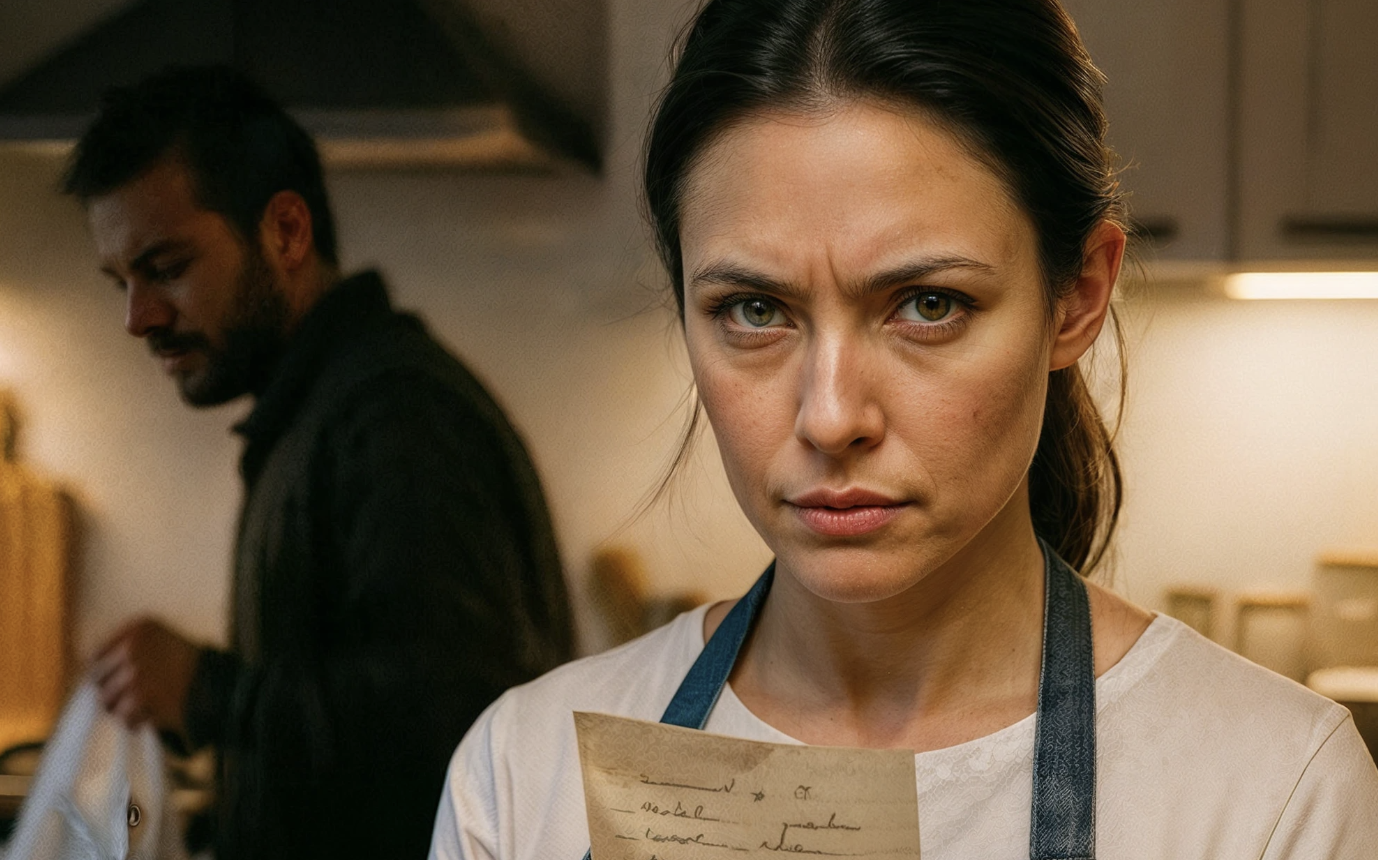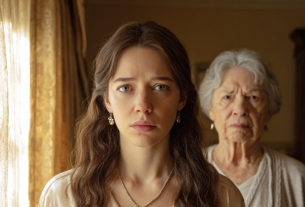Olya will cook something, like always…” Viktor’s voice rang out as he answered his relatives, staring at the empty fridge. I didn’t start cooking—I decided to make a record of the food that had been eaten.
I opened the fridge and froze for a moment, peering into the emptiness. On the middle shelf stood a lonely jar of brine with the last pickle floating in it. Next to it, a dried-out piece of cheese and a small packet of mayonnaise. That was all.
I ran my finger along the cold shelf. Just yesterday there had been a big pot of borscht here, cutlets neatly wrapped in foil, a container of salad. In the freezer—only ice and a single bag of dill, frozen back in August.
The phone rang in the hallway, Viktor picked up, and I stayed in the kitchen, wiping an already perfectly clean table and catching scraps of the conversation.
“Yeah, hi, Mom… Yes, of course, we remember… No-no, we weren’t planning anything… What, Sveta will be there too? Great…”
I froze with the rag in my hand; that familiar unpleasant feeling slowly clenched in my stomach.
“Of course, come over. Yeah, Olya will cook something tasty, like always…”
I put the rag down on the table. His words sounded as if I wasn’t his wife, but a built-in part of the family system, a function called “make something tasty.” He hung up and carefully looked at me.
My gaze fell on the empty shelf where the honey cake had stood just yesterday. Only two weeks ago I’d spent half a day making it according to my mom’s recipe: rolling out layers thin as paper, cooking the custard, assembling the cake and sprinkling it with crumbs.
At the table, Anna Petrovna, his mother, had taken a small piece, tried it and, addressing her son, said:
“Tasty, of course, Vityusha, but it’s very sweet. At our age we need to watch our sugar…”
His sister Sveta added with light, sympathetic intonation:
“Mom, oh come on, Olya tried… probably.”
That “probably” sounded like a quiet verdict. The cake stayed on the table, bitten into, a symbol of effort wasted for nothing.
And now the fridge was empty again, but this time the cold was inside me.
My mother-in-law doesn’t eat store-bought ‘chemicals,’ and my husband invited her to look at empty shelves. I made a list of the most expensive products: let this tradition hit his wallet from now on.
“What do you mean, ‘buy food for your relatives’?” I broke the silence.
Viktor stared at the floor, his hands in his pockets, as if he were looking for an escape hatch down there in the linoleum.
“Well… Mom… Sveta… you know how it is. They’ll come… it’ll be awkward if the table is empty.”
“‘Awkward’ is when I’m put in front of a done deal,” I flung open the fridge door, showing the result of other people’s appetites. “This, Vitya, isn’t awkward, it’s a pattern.”
He scratched the back of his head.
“Well… family traditions…”
“Family traditions… We had traditions in my family too. Guests were greeted with whatever was in the house, and people were happy to see them, we didn’t work for them like in a factory canteen. And we also had a tradition of bringing a small cake with you.”
He shifted from foot to foot, as if he had nothing else to say.
“Fine, since we have such guests, we need to prepare properly.”
I took a pretty leather-bound notebook from the shelf—the one he’d once given me—and a good pen. My movements were slow. This wasn’t the start of a hysterics; it was the start of a calculated operation.
“Dictate what your mother likes.”
He raised his eyes to me in surprise; I caught a flicker of relief there, as if the storm had passed.
“Well… beef tenderloin, only from the central market, from Aunt Masha, remember?”
“I remember. The kind that’s a thousand per kilo, or can we get something simpler?”
“Oh, only that one… Next.”
“Cottage cheese… farmhouse, 9%, the kind they bring in the morning to the little shop by the park.”
“Got it. Vitya, why doesn’t your mother eat store-bought cottage cheese?”
“Well… there’s chemicals in it.”
“I see, chemicals. What else?”
Not sensing the trap, he started to perk up a bit.
“Oh! And that cheese with holes, the one Sveta likes, but Swiss, not ours. They sometimes have it at the shop on the corner, but not always.”
“So we’ll check.”
“And ‘Ptichye Moloko’ candies. Only Rot Front, she doesn’t acknowledge any others.”
“Of course. That’s it?”
“That’s it, I don’t think there’s anything else special.”
I looked at the neatly written list.
“You’re doing great, Vitya.
Let’s see how much your mother’s love costs us!” I sent my husband for the Swiss cheese. And for the first time he saw how expensive his relatives’ nerve costs really are.
Saturday morning. I touched my husband’s shoulder; he was lying with his back to me, facing the wall.
“Get up, provider.”
Viktor mumbled something and tried to pull the blanket over his head. I set yesterday’s list, the bank card, and a printed city map down on the pillow in front of him.
“Time to go get the groceries.”
He sat up on the bed, rubbing his eyes, stared at the papers for a few seconds, then gave me a sleepy, confused look.
“Olya… what are you doing? Maybe we’ll just buy everything at the supermarket next door?”
I feigned surprise.
“What, for your mom? Are you serious? She’ll sense it right away, she’ll be offended.”
Viktor let out a heavy sigh and reached for his jeans hanging on the chair. He knew that tone; arguing was pointless.
“Here’s the market. Meat from Petrovich, he starts selling from six in the morning. Tell him you’re from Olga, he’ll set aside the best piece for you, just don’t be late or the wholesalers will take everything. And here’s the shop with the cottage cheese, the fresh delivery is exactly at seven.”
I handed him the map.
“The money is on the card, it should be enough. Just keep all the receipts, okay? I’m curious how much your mother’s love costs us.”
He flinched at my last phrase, silently grabbed the car keys and left.
An hour later the first call came.
“Olya, I’m at the market, I can’t find your Petrovich!”
“Vitya, you’re a grown man, ask people. You’ll manage, I believe in you.”
And I hung up.
The second call was from the cheese shop.
“Olya, have you seen how much this costs?!” he was practically shouting. “This Swiss cheese is like the price of a plane wing! Maybe we should take ours instead? Poshekhonsky?”
“Vitya, you know Sveta doesn’t like ‘our’ cheese, she’ll be upset, don’t skimp on your relatives. Please, darling, don’t make me ashamed in front of your sister.”
I heard a heavy sigh in the receiver.
The climax was a call from Anna Petrovna.
“Olya, what are you thinking?! Vitenka just called me! You’ve made my son run around some warehouses! The child is exhausted!”
“Anna Petrovna, what are you talking about! This is his initiative! He says: ‘I want to make Mommy happy, I’ll pick everything myself, only the very best!’ A real son, your pride! I’m so impressed by him right now! Don’t stop him from doing something nice for you.”
Silence hung on the other end of the line.
My mother-in-law grew embarrassed when she saw the empty pots, and I said: Vitya set the table all by himself. Let’s thank him! In that moment he realized for the first time what I had done.
By evening Viktor came back, practically fell into the apartment, shoulder-slamming the door open. Three huge, backbreaking bags landed with a dull thud on the hallway floor. His face was flushed, his hair wet.
He sat down on the little hallway stool, breathing heavily, silently untying his shoes. He didn’t raise his head, hunched over, staring at one spot.
Soon the doorbell rang—the relatives. They came in loud, cheerful, already anticipating a hearty dinner.
“Olenka, hello! And what smells so good here?” started Anna Petrovna, though the flat smelled only of her son’s exhaustion.
“Hello. Ask Viktor, he’s the main one today.”
They went into the kitchen, their eyes slid across the empty table and then stopped on me. Svetlana peeked into the empty pots on the stove.
“And what… are we having for dinner?”
I nodded toward the bags in the hallway.
“Well, Vitya brought it all. Only the freshest, the finest delicacies. I’m afraid to even touch such products, I’ll just ruin them. We’ll probably just slice everything: the cheese, the tenderloin…”
An awkward silence fell; Anna Petrovna and Svetlana exchanged glances. They had to unpack the bags themselves, take out their son’s and brother’s trophies, look for plates. I simply sat there with my hands folded in my lap, watching.
There was tension at the table; they were eating the expensive tenderloin and Swiss cheese, but without their former pleasure. Because now this food tasted of Vitya’s torments at the market, his anger over the phone. He sat next to me, shoulders slumped, pushing food around his plate with his fork, barely raising his eyes.
When the pause became unbearable, I smiled gently:
“Mom, don’t scold me if something’s not right. This is all Vitya—he picked it, he bought it, he brought it. A truly caring son, let’s thank him.”
Anna Petrovna blinked in confusion, a piece of cheese on her fork; Svetlana buried her face in her plate, and Viktor lifted his heavy, resentful gaze to me. And in that gaze, for the first time, I saw not only resentment, but understanding—he understood everything.
My husband himself cancelled the visit to his mother when I opened the notebook to a blank page. He realized that my list was the price of his weakness, a price he was no longer willing to pay.
Dinner ended quickly; conversation didn’t flow. The relatives left almost immediately after the meal, citing tiredness. No “see you next weekend” or “that was delicious.”
On the way out, Anna Petrovna patted her son on the shoulder:
“Get some rest, son, you look worn out.”
It was the final jab, aimed of course not at him, but at me.
Viktor and I were left alone among the dirty dishes and leftovers of expensive food on the table. He was silent for a long time, gathering the plates and stacking them in the sink, then he turned to me:
“Why did you do that?”
“And how else, Vitya? What other way is there? I tried talking, you didn’t listen. Now you’ve felt it.”
He didn’t answer, just turned away and turned on the water.
A week went by in silence; we barely spoke, keeping to purely practical phrases. The tension hung in the apartment.
On Friday evening he came up to me while I was watering the plants, shifting nervously as he searched for words.
“Olya… maybe… this weekend… guests…” I could see how hard it was for him to say it.
I said nothing, set the watering can down, went over to the dresser, took out the leather notebook and the pen. Sat down at the table and opened it to a clean page.
He looked at me, then at the blank sheet, and panic flickered in his eyes. He understood: this wasn’t a threat, just a reminder.
Silently he turned around, took his phone and went out onto the balcony, carefully closing the door behind him. Through the glass I could see his silhouette, standing with his back to me, the phone pressed to his ear. His voice was firm, without the childish, ingratiating notes:
“Hi, Mom. Yeah. This weekend we’re going to Olya’s parents for pancakes. Yeah, we’ve already arranged it. Next weekend? Mom, let’s talk during the week and see. Okay, bye.”
He came back in, put the phone on the table and walked past without looking at me.
I put the pen and notebook back in the dresser drawer and went to the fridge. Same jar of brine and packet of mayonnaise, but now that emptiness no longer weighed on me; it was a symbol of freedom.
I took a big red apple from the fruit bowl and, for the first time in a long while, truly smiled



